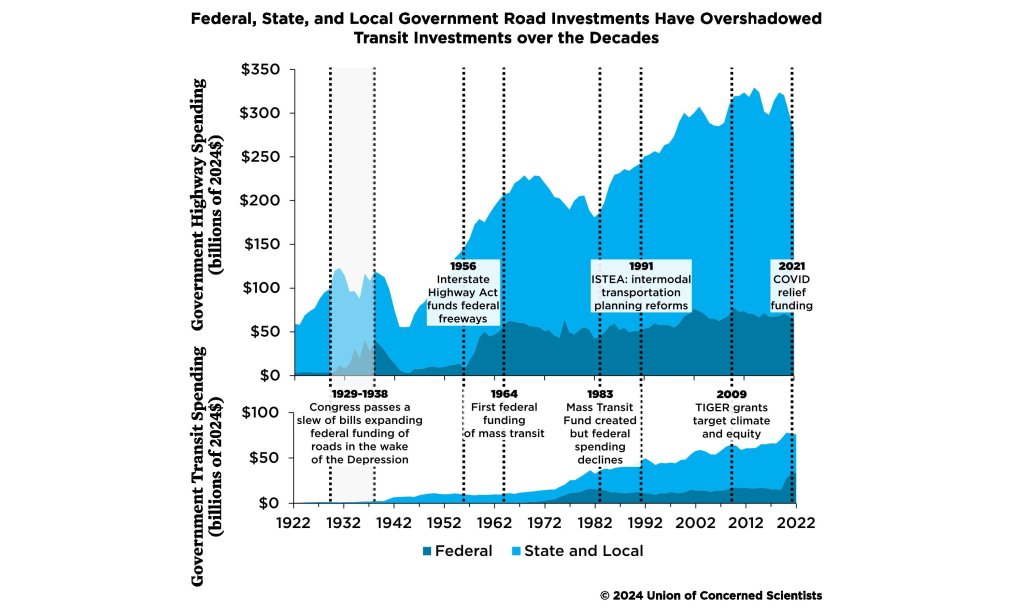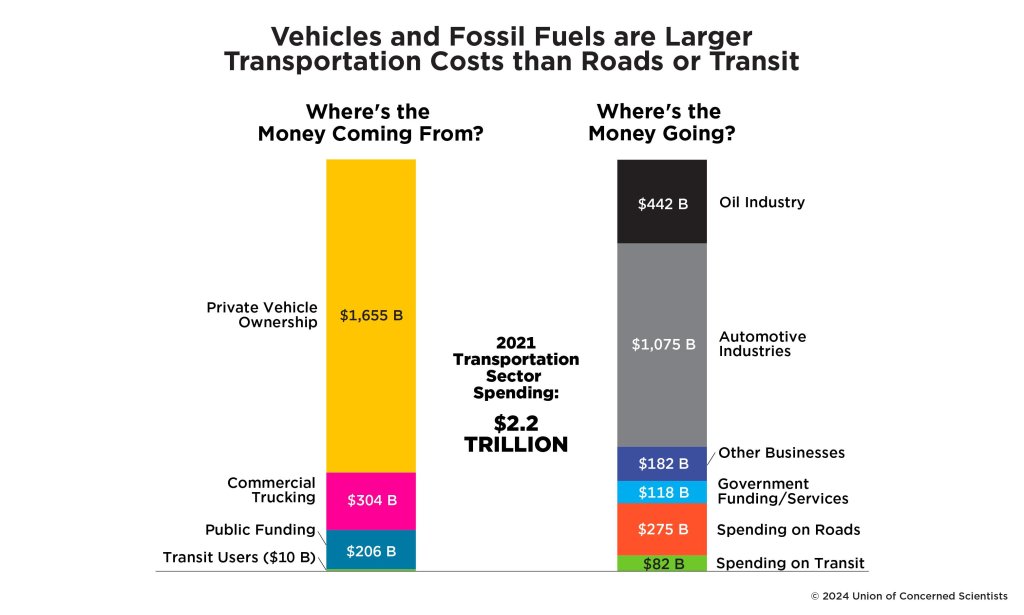This Union of Concerned Scientists study examines why and how to improve resource-efficient travel options to achieve diverse goals. It estimates that more efficient transport could save up to $201 billion in energy and $128 billion in health costs.

The new Union of Concerned Scientists study, Freedom to Move: Investing in Transportation Choices for a Clean, Prosperous, and Just Future, shows that a transportation system that gives everyone more transportation choices will be more equitable, save trillions of dollars, and fight climate change. More transportation options such as transit, walking and biking are good for the environment, economy, and social equity.
It finds that:
-
A system with improved transportation options and reduced driving could save up to $201 billion in energy infrastructure and $128 billion in public health costs through 2050, presenting a more effective climate solution than the current car-dependent model.
-
The auto and oil industries have a vested interest in car dependence, currently receiving more than 75 percent of public and private transportation spending and have lobbied for decades to prioritize cars over a more complete and affordable set of transportation options.
-
Science-based policies that prioritize more transportation choices align with community-based solutions where local advocates have long fought for a transportation system that prioritizes people over industry interests.

Recommendations
-
Invest in a complete set of transportation options for a system that offers abundant access to everywhere we need to go and promotes economically thriving communities in both urban and rural areas. This means investing in networks of safe sidewalks for pedestrians, paths for biking and micromobility, and frequent, wide-ranging, affordable, and clean public transportation. These efforts depend on promoting land use changes that allow people to live near high-quality transit without displacement, dismantling structural racism in community safety, and ensuring good jobs with high labor standards.
-
Prioritize transportation projects in rational ways, including the extent to which they help achieve climate goals, reduce harm to communities experiencing the greatest impacts, and improve access for those who need it the most. This will necessarily mean meeting more rigorous standards for expensive, high-polluting highway expansion projects that commit us to high maintenance costs. Instead, we must first address the backlog of existing infrastructure maintenance. Also, state departments of transportation and metropolitan planning organizations must be accountable and transparent in their decisionmaking on what gets built.

-
Make transportation decision-making processes representative, and meaningfully engage the people and communities most affected by proposed projects. For decades, the auto, fossil fuel, and road-building industries have profited from excessive highway expansion and denied us choice in transportation. All of us, whether Black, brown, or White, whether US-born or immigrant, deserve to have a seat at the table to ensure transportation projects truly benefit our communities.
FULL STORY: Freedom to Move

Planetizen Federal Action Tracker
A weekly monitor of how Trump’s orders and actions are impacting planners and planning in America.

Chicago’s Ghost Rails
Just beneath the surface of the modern city lie the remnants of its expansive early 20th-century streetcar system.

Amtrak Cutting Jobs, Funding to High-Speed Rail
The agency plans to cut 10 percent of its workforce and has confirmed it will not fund new high-speed rail projects.

Ohio Forces Data Centers to Prepay for Power
Utilities are calling on states to hold data center operators responsible for new energy demands to prevent leaving consumers on the hook for their bills.

MARTA CEO Steps Down Amid Citizenship Concerns
MARTA’s board announced Thursday that its chief, who is from Canada, is resigning due to questions about his immigration status.

Silicon Valley ‘Bike Superhighway’ Awarded $14M State Grant
A Caltrans grant brings the 10-mile Central Bikeway project connecting Santa Clara and East San Jose closer to fruition.
Urban Design for Planners 1: Software Tools
This six-course series explores essential urban design concepts using open source software and equips planners with the tools they need to participate fully in the urban design process.
Planning for Universal Design
Learn the tools for implementing Universal Design in planning regulations.
Caltrans
City of Fort Worth
Mpact (founded as Rail~Volution)
City of Camden Redevelopment Agency
City of Astoria
City of Portland
City of Laramie




























